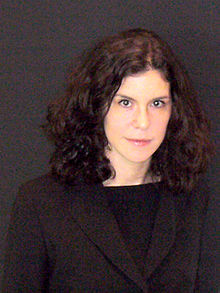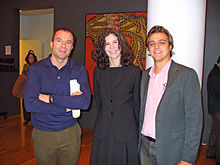- Megan McArdle
-
Megan McArdle (born January 29, 1973) is a Washington, D.C.-based blogger and journalist. She writes mostly about economics, finance and government policy from a moderate libertarian or classical liberal perspective. She currently serves as the business and economics editor, as well as a blogger, for The Atlantic. She is a Bernard L. Schwartz fellow at The New America Foundation. She has had book reviews and opinion pieces published in the New York Post, The New York Sun, Reason, The Guardian[1] and Salon.com.[2]
Contents
Early life
McArdle was born and raised in New York City. She has an undergraduate degree in English Literature from the University of Pennsylvania, and an MBA from Chicago Booth.[3]
Journalistic career
McArdle began blogging in November 2001; her blog was originally called "Live From The WTC", because she was working at the time for a construction firm doing cleanup at the World Trade Center site following the September 11 attacks. She wrote under the pen name "Jane Galt". The name was a play on "John Galt", the name of a central character in Ayn Rand's Objectivist novel Atlas Shrugged; though her political perspective could best be described not as Objectivist but as moderate libertarian or classical liberal. In November 2002 she renamed the site "Asymmetrical Information", a reference to the economics term of the same name. That blog had two other occasional contributors, Zimran Ahmed (writing under the pen name "Winterspeak") and the pseudonymous "Mindles H. Dreck".
McArdle was helped early in her career by journalism internships arranged through the Institute for Humane Studies at George Mason University.[4] McArdle has returned to IHS as a lecturer.[5][6]
McArdle achieved some online fame in May 2003 for coining what she termed "Jane's Law", in a blog post.[7] The law, written with regard to the two main U.S. political parties, Republicans and Democrats, reads: "The devotees of the party in power are smug and arrogant. The devotees of the party out of power are insane." Another well-known post of hers, from April, 2005, discusses why she takes no position on the issue of same-sex marriage; she wrote, "All I'm asking for is for people to think more deeply than a quick consultation of their imaginations to make that decision... This humility is what I want from liberals when approaching market changes; now I'm asking it from my side [libertarians], in approaching social ones." [8]
In 2003 McArdle was hired by The Economist to write for their print magazine, with the title of Economics Correspondent. In October 2006 she became the main contributor to the Economist's then-new "Free Exchange" blog.
In August 2007 McArdle left The Economist and moved to Washington, D.C. to work as a full-time blogger for The Atlantic, with "Asymmetrical Information" kept as the title of her blog.[9]
By 2010, McArdle had also become The Atlantic's business and economics editor. In February 2010, her blog lost the title "Asymmetrical Information", as The Atlantic switched to having every blog (except Andrew Sullivan's The Daily Dish) be identified solely by its author.[10]
McArdle is an occasional television and radio commentator, having appeared on The Kudlow Report,[11] Fareed Zakaria GPS,[12][13] and NPR's Marketplace.[14]
Based on her career path, journalist Dave Weigel has called McArdle "the original blogger-turned-MSM journo".[15]
Views
Ron Paul
McArdle has been critical of libertarian politician Ron Paul, criticizing him for not strongly disavowing racist statements in his newsletters,[16] arguing against his championing of tax credits, and accusing him of lacking specificity about cutting government spending.[17] McArdle was also quoted as saying that Ron Paul "doesn't understand anything about monetary policy," and that "he wastes all of his time on the House Financial Services Committee ranting crazily."[18]
U.S. automotive bailout
In late 2008, McArdle wrote extensively against a proposed federal bailout of the U.S. auto industry (which ultimately occurred in early 2009). In November 2008, various of McArdle's blog posts on the subject were quoted approvingly by conservative commentators David Brooks,[19] Michael Barone[20] and John Podhoretz,[21] among others.
Elizabeth Warren
McArdle wrote several posts criticizing the research of Harvard professor (and later U.S. Senate candidate) Elizabeth Warren. She called a study that Warren co-authored, about the link between medical expenses and bankruptcy, "actively, aggressively wrong."[22] She later criticized the same study for, among other things, using statistics from 2007, a year that had markedly fewer bankruptcy filings than the average.[23]
McArdle's was criticized by several scholars, including University of California Professor Kathryn Porter[24] and Massachusetts Institute of Technology Professor Thomas Levenson.[25] Some called McArdle's statement that a survey had received only a 20% response rate inaccurate, since the survey's questionnaire had a 50% response rate (a subsequent interview had a 20% response rate.) [26] According to some critics, McArdle also inaccurately claimed that Professor Warren suggested that medical problems were the sole cause of bankruptcy, when Warren in fact claimed that medical expenses were among several contributing causes.[27]
National health care
Since 2009, McArdle has argued extensively against instituting a system of national health insurance in the United States, and specifically against the federal health care reform bill the Patient Protection and Affordable Care Act, which was passed in March 2010. In addition to a number of blog posts on the subject, she also wrote an article on the subject, "Myth Diagnosis", in the March 2010 Atlantic.[28]
In a July 2009 blog post, McArdle listed two reasons that she objected to such a system: first, that it would stifle innovation, because "Monopolies are not innovative, whether they are public or private," and second, that "Once the government gets into the business of providing our health care, the government gets into the business of deciding whose life matters, and how much."[29] Commentator Ezra Klein of the Washington Post criticized this post, writing, "In 1,600 words, she doesn't muster a single link to a study or argument, nor a single number that she didn't make up (what numbers do exist come in the form of thought experiments and assumptions). Megan's argument against national health insurance boils down to a visceral hatred of the government."[30]
In an August 2009 post, McArdle reiterated, "My objection is primarily, as I've said numerous times, that the government will destroy innovation. It will do this by deciding what constitutes an acceptable standard of care, and refusing to fund treatment above that. It will also start controlling prices."[31]
In a comment to that post, McArdle stated, "The United States currently provides something like 80-90% of the profits on new drugs and medical devices. Perhaps you think you can slash profits 80% with no effect on the behavior of the companies that make these products. I don't." In a subsequent Washington Post online chat, a commenter asked her, "You said that medical innovation will be wiped out if we have a type of national health care, because European drug companies get 80% of their revenue from Americans. Where did you get this statistic?" McArdle responded that it was "a hypothetical, not a statistic." This was criticized in a blog post in The New Republic.[32] In response to this criticism, McArdle stated that she had misunderstood the question, and "thought the commenter was referring to the postulated hypothetical destruction of all US profits." She also stated that, though "there are no hard numbers available", she estimated that the U.S. contribution to pharmaceutical profits was at least 60%.[33]
The article "Myth Diagnosis" was quoted approvingly by conservative writer Timothy P. Carney of The San Francisco Examiner.[34] It was criticized, however, by several doctors and health policy academics who stated that she underplayed the health consequences of going without health insurance.[35]
Criticism
Inaccuracies and math mistakes
McArdle has been criticized for stating in a blog post that raising taxes on the rich would result in an extra $25 per American, when, according to the math, the actual value was $250 (she later corrected this error).[36]
Possible conflict of interest
Commentator Mark Ames has accused McArdle of having a conflict of interest when reporting on the Koch family,[37][38] because her husband, Peter Suderman, has received financial support from them. McArdle maintains that the funding has not influenced her writing about the Kochs.[39] Prior to Suderman receiving the financial support, McArdle defended the Kochs against accusations that they covertly fund the Tea Party movement.[40]
Personal life
McArdle married journalist Peter Suderman in 2010.[41] She was a vegan for a year in 2008, which she ended due to a soy allergy caused by Hashimoto's thyroiditis.[42] She has written: "I must stand up for vegan or vegetarian 'chicken' nuggets. They are delicious. Even though I now eat meat again, I still prefer the vegetarian version to the 'real' thing, especially after seeing what chicken nuggets are made from."[43]
References
- "What's Your Story?", Cheryl Miller, AFF's Doublethink, April 15, 2007
Notes
- ^ McArdle Profile on Guardian.co.uk
- ^ Atlantic Wire Launches With (Media) Star-Studded Fete, FishBowlNY, September 23, 2009
- ^ The normblog profile 195: Megan McArdle, NormBlog, June 15, 2007
- ^ http://www.theihs.org/ihs-journalism-internship-program/ihs-alumni-journalism
- ^ http://www.theihs.org/guest-lecturers/megan-mcardle
- ^ http://www.theihs.org/ihs-journalism-internship-program/journalism-free-society-seminar
- ^ Untitled, Megan McArdle, Asymmetrical Information, May 21, 2003
- ^ "A really, really, really long post about gay marriage that does not, in the end, support one side or the other", Megan McArdle, Asymmetrical Information, April 2, 2005
- ^ McArdle Leaves The Economist For The Atlantic FishBowlDC
- ^ "Housekeeping Note", February 25, 2010
- ^ End of the Recession?, The Kudlow Report, October 29, 2009
- ^ Sunday Show Preview FishbowlDC
- ^ Fareed Zakaria GPS Transcript, CNN, March 22, 2009
- ^ Weekly Wrap: Another bubble?, Marketplace, Friday, November 13, 2009.
- ^ http://twitter.com/daveweigel/status/51719391955525632
- ^ Ron Paul roundup, Megan McArdle, January 8, 2010
- ^ Ron Paul on taxes, Megan McArdle, December 28, 2007
- ^ Weigel, David (2010-12-10) Congratulations! Now Shut Up.: Why Ron Paul's newfound power both pleases and worries libertarians., Slate
- ^ Bailout to Nowhere, David Brooks, The New York Times, November 18, 2008
- ^ Detroit Automakers a Relic of the Past, Michael Barone, Human Events, November 15, 2008
- ^ Bailouts Necessary and Unnecessary, John Podhoretz, Contentions, November 11, 2008
- ^ Elizabeth Warren and the Terrible, Horrible, No Good, Very Bad, Utterly Misleading Bankruptcy Study, Megan McArdle, The Atlantic, June 4, 2009
- ^ Considering Elizabeth Warren, the Scholar, Megan McArdle, The Atlantic, July 22, 2010
- ^ http://rortybomb.wordpress.com/2010/07/27/megan-mcardles-hack-post-on-elizabeth-warrens-scholarship/
- ^ http://inversesquare.wordpress.com/2010/07/28/she-really-doesnt-like-elizabeth-warren-but-still-cant-count-very-well-megan-mcardle-is-always-wrong-chronicles-next-installment/
- ^ http://rortybomb.wordpress.com/2010/07/27/megan-mcardles-hack-post-on-elizabeth-warrens-scholarship/
- ^ http://rortybomb.wordpress.com/2010/07/27/megan-mcardles-hack-post-on-elizabeth-warrens-scholarship/
- ^ Myth Diagnosis, Megan McArdle, The Atlantic, March 2010
- ^ A Long, Long Post About My Reasons For Opposing National Health Care, Megan McArdle, The Atlantic, July 28, 2009
- ^ http://voices.washingtonpost.com/ezra-klein/2009/07/on_megan_mcardles_case_againt.html
- ^ What Does It Mean To Have a Private Health Care System, Megan McArdle, August 13, 2009, The Atlantic
- ^ http://www.tnr.com/blog/the-plank/megan-mcardles-word-games
- ^ Does the US Really Account for So Much Pharma Profit?, Megan McArdle, The Atlantic, September 2, 2009
- ^ Turns out ObamaCare might not save hundreds of thousands of lives, Timothy P. Carney, The San Francisco Examiner - Beltway Confidential (blog), February 28, 2011
- ^ http://theincidentaleconomist.com/wordpress/our-unpublished-response-to-mcardle/
- ^ http://inversesquare.wordpress.com/2010/07/22/megan-mcardle-is-even-more-always-wrong-than-usual-arithmetic-is-hardmostly-outsourced-edition/
- ^ http://exiledonline.com/megan-mcardles-fiance-confesses-koch-family-sponsors-my-job-at-reason-magazine/
- ^ http://smirkingchimp.com/thread/mark-ames/35161/the-koch-whore-archipelago-how-the-billionaire-kochs-screwed-my-scoop-while-screwing-america
- ^ http://www.theatlantic.com/business/archive/2009/06/the-singular-of-data-is-anecdote/19873/
- ^ http://www.theatlantic.com/business/archive/2009/03/playboy-dips-a-toe-into-investigative-journalism/4770/
- ^ http://www.nytimes.com/2010/06/13/fashion/weddings/13mcardle.html
- ^ McArdle, Megan (31 July 2008). "The end of an era". The Atlantic.
- ^ McArdle, Megan (2011-02-09) In Praise of Cheap Food, The Atlantic
External links
- Megan McArdle's blog at TheAtlantic.com
- Profile at The New America Foundation
- Fellows Homepage at The New America Foundation
- The original Asymmetrical Information
- "Can we sue our own fat asses off?", Megan McArdle, Salon.com, May 24, 2002
- Video debates featuring McArdle on Bloggingheads.tv
- Interview with McArdle
- Podcast featuring Megan McArdle
Categories:- American Jews
- 1973 births
- Living people
- American bloggers
- American libertarians
- The Atlantic (magazine) people
- People from New York City
- University of Chicago Booth School of Business alumni
- University of Pennsylvania alumni
- Writers from Washington, D.C.
- American vegans
Wikimedia Foundation. 2010.


